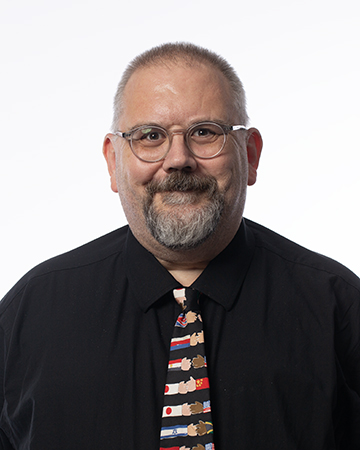Profile for Dean Vesperman

Contact me
Dean Vesperman
Assistant Professor
History
University of Wisconsin-La Crosse
Dean Vesperman
Assistant Professor
History
Specialty area(s)
Citizenship and democracy education
Cultural-Historical Activity Theory
Education Policy
Brief biography
Dr. Dean P. Vesperman is an assistant professor of education in the History Department at the University of Wisconsin-La Crosse. Dr. Vesperman teaches courses in secondary social studies methods. He earned doctorate at Indiana University in Curriculum and Instruction minor in learning sciences. Before earning his doctorate Dean taught junior high and high school social studies for eleven years in southeastern Wisconsin and CTY for 18 summers. Dr. Vesperman has published articles on various pedagogical methods for teaching social studies. He lives in Western Wisconsin with his wife, daughter, and dog
Current courses at UWL
HIS 419 - Teaching and Learning Social Studies in the Secondary School and Field Experience II
Education
BS - University of Wisconsin-Oshkosh - History and International Studies
MEE - Cardinal Stritch University - Brain-Based Teaching and Learning
Ph.D. - Indiana University - Curriculum and Instruction: Curriculum Studies and Learning Sciences
Career
Teaching history
I taught middle and high school social studies for 11 years. I taught 7th Grade World Geography, 8th Grade United States History to 1877, High School courses in American Government, Economics, Psychology, and Sociology, and Film Analysis.
I have taught classes in elementary and secondary social studies methods, educational psychology, foundations of diversity and equity, and education policy.
Professional history
Luther College - 2014-2019
University of Wisconsin-River Falls - 2019-2024
Research and publishing
Blankenship, W. G., Aydinian-Perry, A., Vesperman, D. P., & Missias, M.T. (2025). Contextualizing socio-cultural STEM through historical figures and events. In Pryor C. R. and Kang, R. Socio-Cultural STEM for middle school: A model for student engagement and teacher collaboration (pp. 81-105). Rowan & Littlefield.
Aydinian-Perry, A., Missias, M. T., Blankenship, W. G., & Vesperman, D. P., & (2024). Teaching the Red Summer Through The Chicago Race Riot: A Primary Source Investigation. Oregon Journal for the Social Studies 12(1). p. 14-25.
Smith H., Vesperman, D. P., Frederick, A. (2024). Preparing Teachers for Linguistically Diverse Classrooms. In Andrews, O. S. & Tomlin, A. D. When We Hear Them: Tools to Attune Teachers’ Ears to Voices of Language-Diverse Learners. Information Age Publishing. 257-267.
Aydinian-Perry, A., Missias, M.T., Vesperman, D. P., & Blankenship, W. G. (2024). Whose greatest story is ever told: Historical agency in evangelical Christian American history textbooks. In Allen, A., Kavanagh, A. M., and Ni Cassaithe, C. Moving Beyond a Single Story. Information Age Publishing. 195-213.
Vesperman, D. P., Aydinian-Perry, A., Blankenship, W. G., & Missias, M. T. (2023). Acknowledgements and introduction. In Vesperman, D. P., Aydinian-Perry, A., Blankenship, W. G., & Missias, M. T. Out of turmoil. Catalysts for re-learning, re-teaching, re-imagining history and social studies. Information Age Publishing. Xi-xiii.
Vesperman, D. P. & Pol, M. (2023). Teaching social studies in a time of COVID-19: an examination of contradictions in activity. In Vesperman, D. P., Aydinian-Perry, A., Blankenship, W. G., & Missias, M. T. Out of turmoil. Catalysts for re-learning, re-teaching, re-imagining history and social studies. Information Age Publishing. 57-72.
Kudos
presented
published
presented
presented
published


